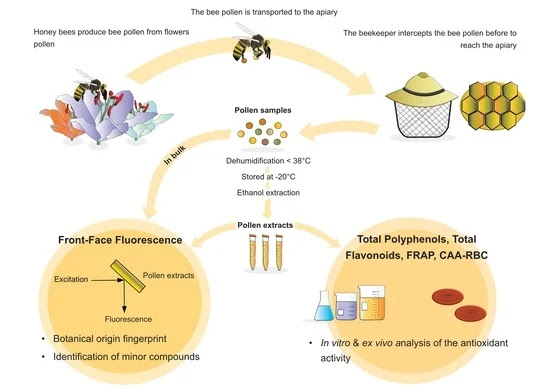Bee products as a source of promising therapeutic and chemoprophylaxis strategies against COVID‐19 (SARS‐CoV‐2)Phytotherapy ResearchThe emergence of novel coronavirus (SARS‐CoV‐2) in 2019 in China marked the third outbreak of a highly pathogenic coronavirus infecting humans. The novel coronavirus disease (COVID‐19) spread worldwide, becoming an emergency of major international concern. However, even after a decade of coronavirus research, there are still no licensed vaccines or therapeutic agents to treat the coronavirus infection.
In this context, apitherapy presents as a promising source of pharmacological and nutraceutical agents for the treatment and/or prophylaxis of COVID‐19. For instance, several honeybee products, such as honey, pollen, propolis, royal jelly, beeswax, and bee venom, have shown potent antiviral activity against pathogens that cause severe respiratory syndromes, including those caused by human coronaviruses. In addition, the benefits of these natural products to the immune system are remarkable, and many of them are involved in the induction of antibody production, maturation of immune cells, and stimulation of the innate and adaptive immune responses.
Thus, in the absence of specific antivirals against SARS‐CoV‐2, apitherapy could offer one hope toward mitigating some of the risks associated with COVID‐19...
Bee products are known for their several medicinal and pharmaceutical properties, which have been explored since the beginning of society. Of these, the antiviral effect and the ability to stimulate the immune system using bee products stand out as potentially promising alternative in the therapy of severe viral respiratory infections, such as COVID‐19.
Moreover, except for bee venom, apicomplexes are generally well tolerated and readily available, which can contribute to wide access in times of pandemic. The immunomodulatory, antiviral, anti‐inflammatory, antioxidant, and pro‐resolving effects of different bee products and their chemical components can be useful in prophylaxis, specific treatment, and even symptomatic treatment of COVID‐19. However, the number of current evidence is overwhelming, and large randomized and controlled clinical trials should be conducted to assess the real benefit of apitherapy against SARS‐CoV‐2.
In this direction, here, we present the numerous possibilities of apitherapy in combating COVID‐19 and highlight the importance of bee products as a promising source of therapeutic and prophylactic strategies against this emergent public health crisis.











































